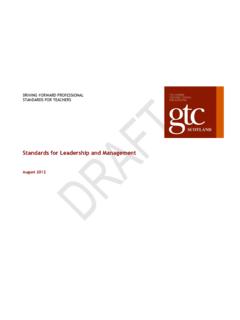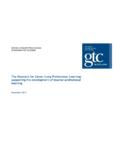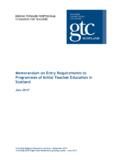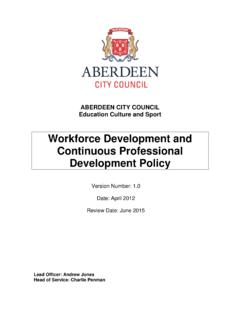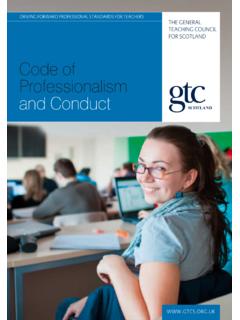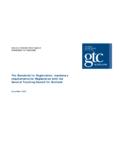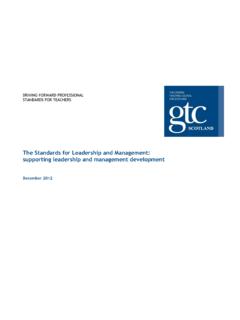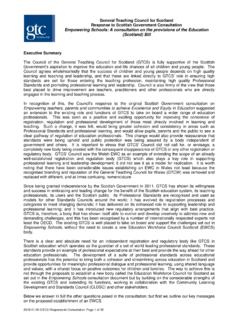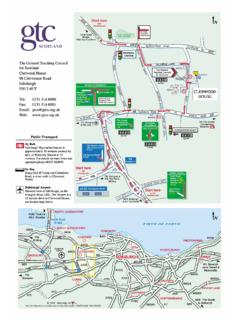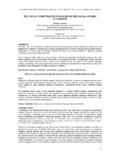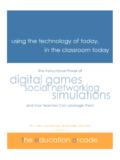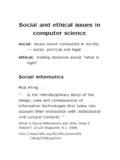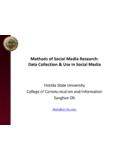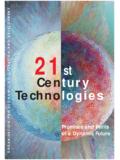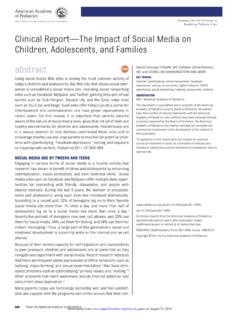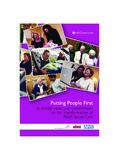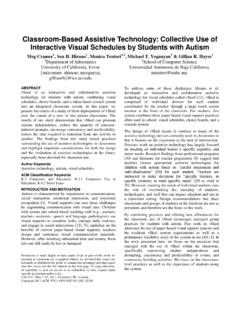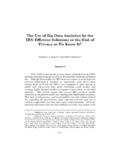Transcription of Professional Guidance on TEACHING COUNCIL FOR …
1 S. ORG. UKTHE GENERAL TEACHING COUNCIL THE GENERAL TEACHING COUNCIL FOR SCOTLANDGTC Scotland, Clerwood House, 96 Clermiston Road, Edinburgh, EH12 6UT Tel. 0131 314 6000, Fax. 0131 314 6001, E-mail. Professional Guidance on the Use of Electronic Communication and social MediaThe Purpose of this Professional GuidanceThe rise in popularity of social media in recent years has resulted in many teachers using social media to enhance their classroom practice, introducing their pupils to new tools and delivering the curriculum in innovative and engaging ways. The majority of teachers using these tools do so without encountering any difficulty.
2 However registered teachers student teachers and others who may seek registration in the future should be aware of the many challenges and ramifications associated with the use of electronic communication and social Professional Guidance will help identify potential dangers, offer some Guidance about how to avoid them and provide a context for responsible, Professional use of electronic communication and social communications and social media include software, applications (including those running on mobile devices), e-mail and websites which enable users to interact, create and exchange information online.
3 Examples include, but are not limited to, sites such as Facebook, Twitter, LinkedIn, YouTube, Wikipedia and MySpace. Also included is the use of SMS and instant messaging systems, such as MSN Messenger and Code of Professionalism and Conduct (CoPAC)This Guidance should be read in conjunction with The Code of Professionalism and Conduct (CoPAC) and the Student Teacher Code (STC), ( the Codes ) in which GTC Scotland sets out the key aspects of teacher professionalism. Maintaining the public s trust in individual teachers, and in the TEACHING profession as a whole, is central to the concept of fitness to teach This trust can be undermined by behaviour occurring not only in a teachers Professional lives but also in their private lives, including activity Contexts for TEACHING and LearningFrom e-mail to text and from blogging to tweets, technology is becoming ever-present in our lives and is an increasingly essential tool in the classroom.
4 New technologies open up a whole range of creative possibilities to help pupils; they provide new access to assignments and resources and connect classrooms with other communities and countries in ways which would have been unthinkable only a few years ability to communicate in real time with others and to access networks across the world offers great opportunities for teachers to promote good learning; it also presents great challenges, as the traditional boundaries between teacher and pupil can quickly become views of teachers about their own profession are central to the integrity of a self-regulating profession.
5 However, the difficulty with social media is that teachers sometimes forget that the things they say and do online may be perceived differently from another point of view. The perspective of parents and the understandable fears of the wider public about inappropriate use of the internet also have to be considered; and these views can sometimes be shaped by sources which are unpredictable - including the media. Teachers therefore need to be alert to the risk that actions which may seem quite innocent can be misunderstood and misconstrued by and Professional lifeIt is important to note that the GTC Scotland Codes emphasise that teachers are individuals with the right to private lives.
6 Off-duty conduct may however still have a bearing on the Professional life of a teacher: actions which may not seem relevant to pupils may still have an impact on a teacher s fitness to teach. Sound judgement and due care should therefore be exercised at all VulnerabilityTeachers can be vulnerable to unintended misuses of electronic communication. E-mail, texting and social media encourage casual dialogue; and very innocent actions can easily be misconstrued or messages are not anonymous and can continue to develop a life of their own long after the original message has disappeared.
7 social Media sites can archive content even when deleted from online profiles. In effect, once information is placed online you relinquish control of media can disarm inhibitions; it brings a new dimension and feel to a relationship. It is particularly important to be mindful of this whenever a student and a teacher consider becoming friends in an online environment. A teacher should never share information with students in ANY environment that they would not willingly or appropriately share in a school or school-related setting, or in the Legal ImplicationsThe Codes draw attention to the potential impact of criminal convictions on registered teachers and on those wishing to become or unwise behaviour online can result in criminal action or, in some cases, civil action brought by others.
8 Online behaviour should therefore be treated with to Teach ImplicationsCentral to GTC Scotland s Fitness to Teach framework is the protection of children, young people and vulnerable adults; and the maintenance of public trust in the TEACHING profession. All complaints are considered fairly and in the same way regardless of whether or not they are associated with the inter-net or involve electronic the area of electronic communication and social media, however, the behaviours listed below have previously warranted disciplinary measures: inappropriate electronic communication with pupils, colleagues and parents/carers, including SMS and instant messaging; posting/sending sexually explicit pictures/images to colleagues or pupils.
9 Grooming - whereby a teacher uses electronic messages with a view to establishing an inappropriate relationship with a pupil; possessing, making, viewing or distributing indecent images of children; using inappropriate YouTube content in the educational can teachers minimise risk when using electronic communication and social networking?As a teacher you should: always maintain a formal and courteous and Professional tone in communicating with pupils and ensure that Professional boundaries are maintained; only use official channels of communication GLOW and work e-mail addresses, and be aware of and comply with employer s policies and Guidance ; not exchange private texts, phone numbers, personal e-mail addresses or photos of a personal nature with pupils; firmly decline student-initiated friend requests from pupils and do not instigate any yourself.
10 Use your own discretion when dealing with friend requests from parents. It is acceptable to decline these invitations and remind parents of more formal channels through which they can discuss their child s education; operate online in a way in which would not call into question your position as a Professional ; realise that pupils will naturally be curious about your personal life outside school and may try to find out more about you. manage your privacy settings and keep them under review. These are particularly important in regard to photos.
